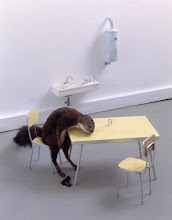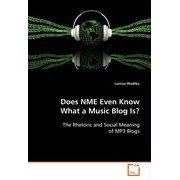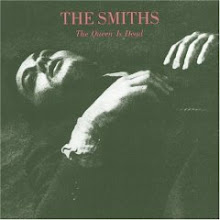
I am by no means an expert on The Germs; in fact, I'm not even really a fan. To be honest, I just never sought them out, nor heard of them til a few years back, but at the same time, I was intrigued by a biopic made about them, Rodger Grossman's What We Do Is Secret. I suppose that being an avid music fan generally makes me interested in any film about music, and punk as a cultural/sociological phenomenon has interested me for years. All I knew going in to see the film last week at Cinematheque was that The Germs were a chaotic punk band from California in the late 70's and that their frontman, Darby Crash, overdosed on heroin just before the day that John Lennon was killed, overshadowing his final bid for immortality. I also knew that Shane West, the actor who first found fame in teen romantic comedies and later as part of the TV show ER, had apparently gotten so completely into his role as Darby Crash, that he actually became a member of the recent reformation of The Germs, adopting the moniker, Shane Wreck. Considering this rather slim amount of knowledge, rather than pontificate on whether the film was too slick for the documentary style it was going for, or whether it was actually true to the band members' lives and the facts, I'm more interested in the broader issue of punk rock movies. This musing comes from the experience of being in last Thursday's audience.
I didn't quite know what to expect as far as audience members, but I did assume they would behave like regular audiences that usually attend the independent/arthouse films that Cinematheque runs. I forgot to factor in the possibility that actual Germs fans might come to see the film. About ten or fifteen minutes into the film, I realized my mistake as a large group of "punks" continued to heckle and shout profanities at each other and the film for its entire duration. And they also kept leaving and returning (I know this because I had two girls in pathetically short skirts climb over me about six times). And they thought it would be rather "punk" to light up regular cigarettes in the non-smoking theatre. I know I'm old and I don't consider myself a punk (I love punk music and its aesthetic, but at heart, I could never have been a true punk), but this chaos around me, which emulated the chaos presented in the live shows on screen, really annoyed me. If I had wanted to feel like I was at a punk show, I wouldn't have chosen to watch a film about it. As I braced myself for flying bottles, which never did appear, I kept thinking, "Why show up to a film if you know you won't like it?" and "Why stay for a film if you clearly think it's crap?" In the angry haze of that entire hour and a half, straining to hear dialogue and actually follow the narrative, I didn't think too deeply about my situation. At the time, I did appreciate the life imitating art imitating life dynamic that was happening, but I didn't contemplate the possible reasons for why this was happening. All I really wanted was for Darby Crash to die already, so I could go home.
Now that my head is clearer and I don't wish to bottle every single one of those punk kids, I wonder about whom punk films are intended for. Are they intended for actual punks, or for the more objective voyeurs of punk? Should punk even be made into films? And what kind of films should they be? Just by looking at the list of punk films listed in Wikipedia, it becomes apparent that punk has definitely been filmed to death whether as documentary, mockumentary, or biopic. Whether those that ascribe to the punk subculture actually find The Great Rock 'n Roll Swindle, the Julien Temple mockumentary about the Sex Pistols, and Temple's later Sex Pistols documentary The Filth and the Fury, credible or not is hard to say. Footage of The Germs was included in Penelope Spheeris's documentary The Decline of Western Civilization, which featured other bands of the time like Black Flag and Circle Jerks, and perhaps the fact that it was real footage of the band rather than a neatly constructed narrative with leitmotifs would appease punk fans. At the same time, punk's power and identity was bound up in the pose of sneering and the rejection of everything, including art, which even documentaries ultimately are.
While documentaries featuring live footage of punk artists might seem more credible and true to the punk experience than creative endeavours or biopics, those who are members of the subculture want their subculture to remain as such - not paraded around by those they believe could never truly understand it. If I remember correctly, a lot of the punks in the first showing of Derek Jarman's Jubilee stood up and left. And his rendering of the UK punk scene was pretty nihilist and graphic - unlike the more tempered and formulaic What We Do is Secret. I wonder how many punks actually attended showings of Sid and Nancy.
Punk, like other subcultures, lives and thrives underground to spite the mainstream that either panics about it or wants to co-opt it, and I suppose the point is that punks would never be satisfied or happy about their subculture on celluloid no matter how much a filmmaker tried to enter the inner sanctum of the subculture. And in punk there is no inner sanctum anyway - nothing's supposed to be sacred. But then why should punks care about how their bands and subculture are portrayed on the screen either? Obviously their subculture in which nothing has meaning means something to them. It's a catch-22 that applies specifically to punks - they're supposed to hate everything and consider everything worthless in some sort of snot-nosed arrested adolescence, aspects which make you wonder why they bother caring to be a punk in the first place and which, in turn, led to punk's rather rapid downfall.
Apparently, the re-formed, and likely "reformed," Germs, with Mr. Wreck as their vocalist, played last year's Vans Warped Tour and will once again play this year. I can see why this might rankle both Germs fans and punk fans in general, especially considering the last I heard of Shane West's musical endeavours was a pseudo-punk effort that had a song on the A Walk to Remember soundtrack. Yes, alongside tracks by Mandy Moore and Switchfoot. Then again, anyone who thinks the Vans Warped Tour is punk shouldn't be too fussed anyway.
Lexicon Devil - The Germs
Circle One - The Germs

































































